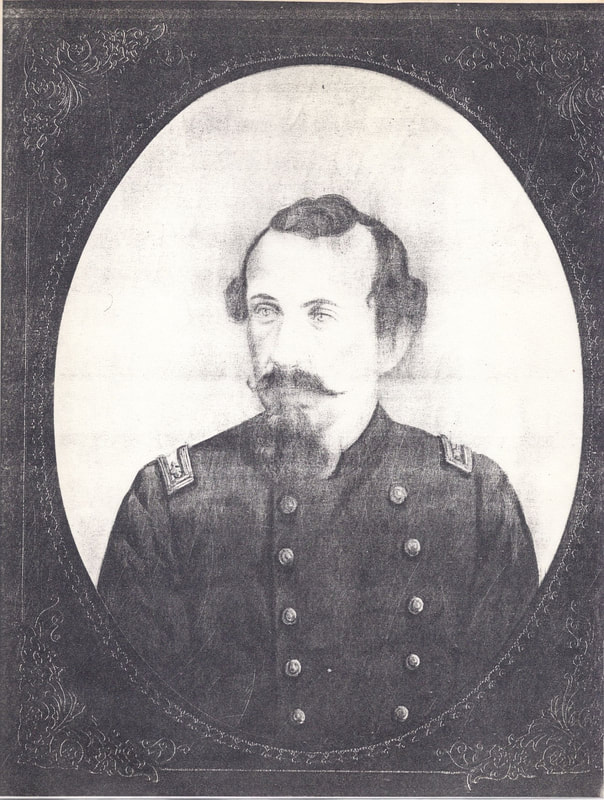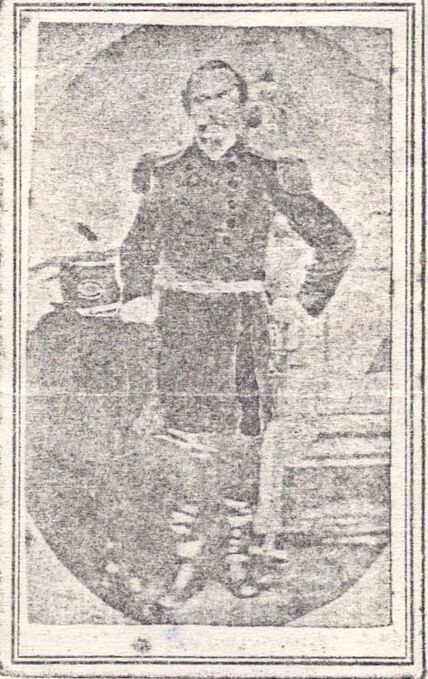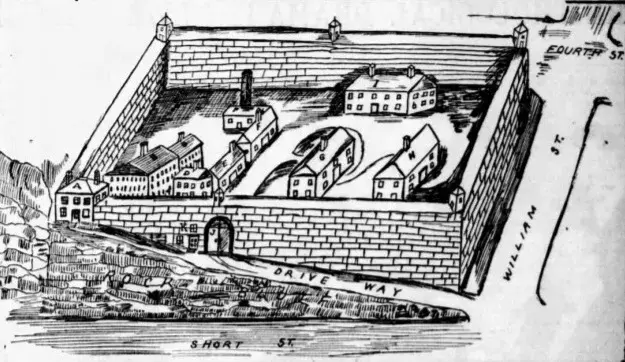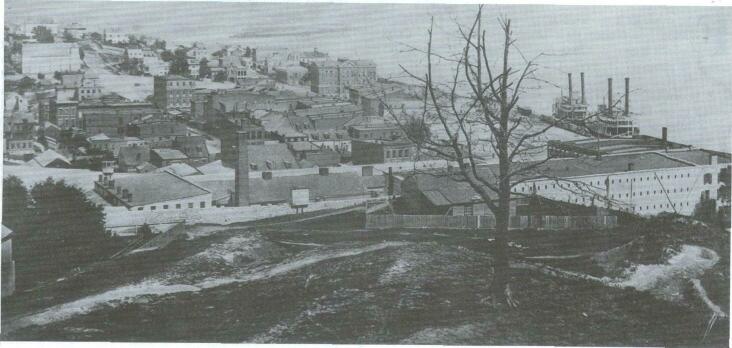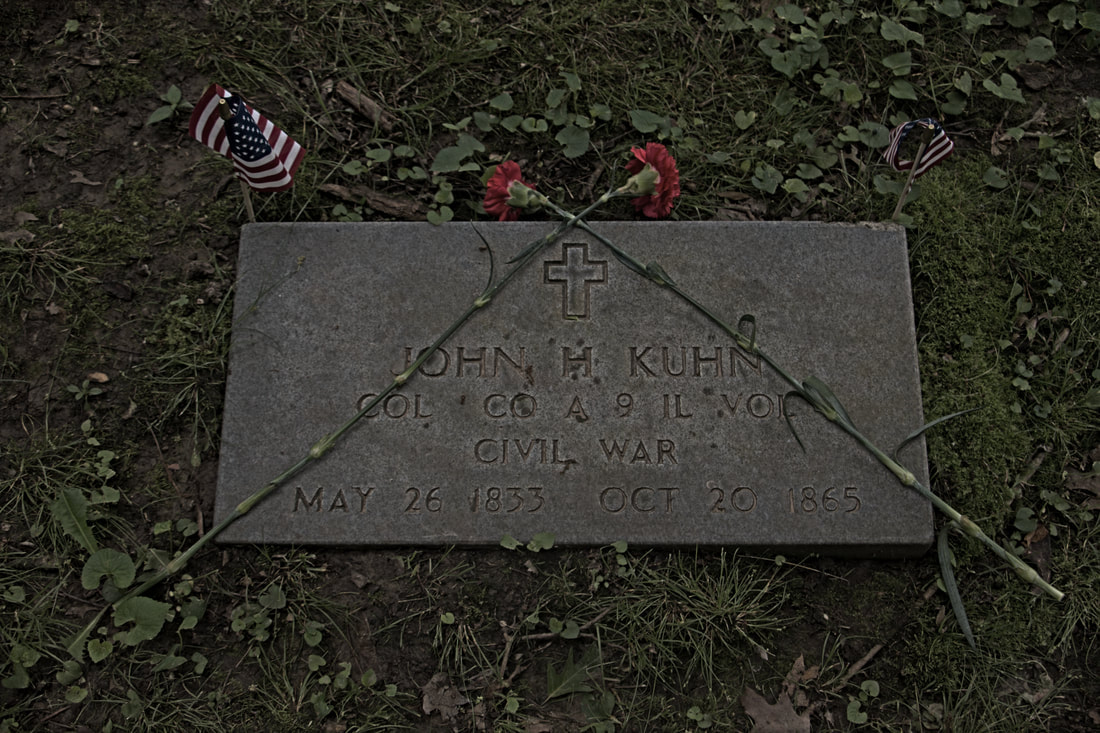Colonel Johann "John" H. Kuhn.
|
Johannes “John” H. Kuhn was born in St. Gallen, Switzerland on May 26th 1833. He emigrated to the United States with his family in 1849. His family initially settled in Pittsburgh, Pennsylvania, however they shortly thereafter moved to Tennessee, where he spent three years. In 1854, the Kuhn family moved in Alton, Illinois. While living in Alton, John was engaged in the lumber business.
In 1853, Captain Gary Weigler, a German immigrant raised a Company of Militia comprised of mainly German immigrants from the East End of Alton. John joined the Alton Jaeger Guard in 1855, and served as one of the Company’s Lieutenants. Over the next 8 years, the Alton Jaeger Guard Company would become a very well organized and equipped militia unit, and the premier group in Alton which had several militia units. |
The Alton Jaeger Guard would serve to quell a prison uprising as well as serve in various capacities in Alton and Madison County.
In 1861, when Lincoln asked for 75,000 men, the company was commanded by then Captain John Kuhn. The company marched with 75 men accompanied by their band to Springfield to muster in with the 9th Illinois Volunteer Infantry. Arriving in Springfield, they were considered to be one of the finest militia units in the state, being fully uniformed and very well drilled.
The men of the Alton Jaeger Guards would become Company A of the 9th Illinois, a regiment made up predominantly of German and Swiss immigrants.
In 1861, when Lincoln asked for 75,000 men, the company was commanded by then Captain John Kuhn. The company marched with 75 men accompanied by their band to Springfield to muster in with the 9th Illinois Volunteer Infantry. Arriving in Springfield, they were considered to be one of the finest militia units in the state, being fully uniformed and very well drilled.
The men of the Alton Jaeger Guards would become Company A of the 9th Illinois, a regiment made up predominantly of German and Swiss immigrants.
|
Captain John Kuhn would be promoted to Major and would lead the regiment as it’s commander at various points in the war. When the Regiment was in Kentucky, Company A would serve as the Provost Guard, and John Kuhn, the Provost Marshall of Paducah, Kentucky. It was while serving in this capacity that John Kuhn was reprimanded for riding through Confederate lines without permission to secure prisoners and goods for the men stationed in Paducah.
Following the occupation of Paducah, the 9th would see action at Ft. Donelson, where the John Kuhn would earn a reputation of being a steadfast leader. The 9th suffered a large number of casualties at Donelson, and Kuhn was the only officer not wounded or killed in the action. On the morning of April 6, 1862, at the Battle of Shiloh, Col. August Mersy, commander of the 9th ordered his regiment to the left to extend the flank of Gen. Stephen Hurlbut’s Division near the Peach Orchard. |
There they took position in a ravine which gave them cover from attacks. By 2:00 PM, their position had been outflanked and the ravine that had provided protection became a trap. They would suffer the heaviest casualties of any Union regiment at Shiloh with 578 present for duty, they lost 61 killed, 300 wounded and 5 prisoners. Mersy and Lt. Col. Jesse Phillips were both wounded leaving Kuhn as the only unwounded field officer. Kuhn would then become the acting commander of the 9th Illinois Infantry.
John Kuhn was wounded at the Battle of Corinth. Then, he was detailed during some months in the Summer and Fall of 1863, in charge of convalescent camp in Memphis, Tennessee. Rejoined the Regiment at Athens, Alabama, November 21st, 1863.
While in Alabama, according to the diary of the Adjutant of the 9th Illinois, John Kuhn also made the Emancipation Proclamation a very real thing for one particular slave. One morning a slave requested from the Adjutant to speak with the Colonel commanding, stating that her master planned on selling her, however she really would rather stay with the soldiers. As it was very early in the morning, the Colonel at the time did not wish to speak with her, however John Kuhn did. According to the diary, John Kuhn, “told her at once that she could go along. The freed slave came into Decatur, Alabama with the regiment.
John Kuhn was wounded at the Battle of Corinth. Then, he was detailed during some months in the Summer and Fall of 1863, in charge of convalescent camp in Memphis, Tennessee. Rejoined the Regiment at Athens, Alabama, November 21st, 1863.
While in Alabama, according to the diary of the Adjutant of the 9th Illinois, John Kuhn also made the Emancipation Proclamation a very real thing for one particular slave. One morning a slave requested from the Adjutant to speak with the Colonel commanding, stating that her master planned on selling her, however she really would rather stay with the soldiers. As it was very early in the morning, the Colonel at the time did not wish to speak with her, however John Kuhn did. According to the diary, John Kuhn, “told her at once that she could go along. The freed slave came into Decatur, Alabama with the regiment.
|
After serving his 3 years with the 9th Illinois, he returned home to Alton with the remnants of his Jaeger Guards. After being home in Alton for less than a month, he helped organize the 144th Illinois Volunteers. This regiment was organized to guard the prison in Alton, and Kuhn served as their Lieutenant Colonel and later commander until the end of the war, mustering out of that regiment as a Colonel.
|
This view of Alton, Illinois in 1862 clearly shows the prison in the foreground as the large white structure. The building with the multiple windows was the original blockhouse when the prison was the State Penitentiary before the war.
John married Caroline Yaeckel before the war, a woman from a rich brewers family. The Yaekels owned what would later become Bluff City Brewery. In 1865, John Kuhn became part owner and invested in the Yaekel’s brewery which was struggling, and decided to make a go of helping run a brewery as his peace time occupation.
Unfortunately, just six months later, in October of 1865, John Kuhn was dead.
|
Though his death was listed in the paper as an accident, his burial records state he was strangled. John Kuhn, the war hero, and prominent commander of the Alton Jaeger Guards was buried next to his parents in the Alton Cemetery. His parents, from working class backgrounds did not have permanent markers, and John, though married into a rich family, wasn’t given a permanent marker.
|
An interesting story about John Kuhn, was shared in the Alton Telegraph in May of 1879;
"As we were coming up from St. Louis last evening, on the fast express, in company with Dr. E. Guelich, he beguiled the time in relating some incidents of army life, one of which was a good illustration of how charity is sometimes rewarded.
Some twenty years before the war, said the Doctor, the late Col. John Kuhn of Alton, then a boy ten or twelve years old, was on his way to join his parents in East Tennessee. Traveling up the Tennessee River, his funds became exhausted and he was put off the boat at Decatur, Alabama.
Wandering up into the town, he sat down on the porch of a hotel kept by a widow woman named McCarty. There he sat forlorn and wretched, without money or friends. The kind hearted landlady saw him crying and asked the cause, whereupon he told his story which aroused her sympathies and she took the friendless boy into the hotel, gave him his meals and lodging, and the next day provided means for him to pursue his journey.
Twenty years after the incident occurred, the Federal armies were approaching Decatur. In command of the advance column was the same friendless boy above mentioned, at that time Major of the Ninth Illinois. The day before the army occupied the town, Dr. Guelich entered it under a flag of truce and was requested by Maj. Kuhn to ascertain if a Mrs. McCarty still lived there and kept a hotel. On receiving information that his benefactress was still living, Maj. Kuhn issued strict order to the troops not to molest Mrs. McCarty, or her hotel. Decatur was burned, only one house being left standing, and that was the hotel of widow McCarty.
Maj. Kuhn, when he left the place, obtained protection papers for Mrs. McCarty from the Provost Marshall and she drove such a thriving business during the war by means of the privileges obtained for her by the grateful Major that she made a fortune. Such was the return she received after many years for an act of disinterested kindness to a poor boy. Unlike many similar stories which are common in story books, this incident has the merit of being an actual occurrence."
- Alton Daily Telegraph - May 14th, 1879.
Some twenty years before the war, said the Doctor, the late Col. John Kuhn of Alton, then a boy ten or twelve years old, was on his way to join his parents in East Tennessee. Traveling up the Tennessee River, his funds became exhausted and he was put off the boat at Decatur, Alabama.
Wandering up into the town, he sat down on the porch of a hotel kept by a widow woman named McCarty. There he sat forlorn and wretched, without money or friends. The kind hearted landlady saw him crying and asked the cause, whereupon he told his story which aroused her sympathies and she took the friendless boy into the hotel, gave him his meals and lodging, and the next day provided means for him to pursue his journey.
Twenty years after the incident occurred, the Federal armies were approaching Decatur. In command of the advance column was the same friendless boy above mentioned, at that time Major of the Ninth Illinois. The day before the army occupied the town, Dr. Guelich entered it under a flag of truce and was requested by Maj. Kuhn to ascertain if a Mrs. McCarty still lived there and kept a hotel. On receiving information that his benefactress was still living, Maj. Kuhn issued strict order to the troops not to molest Mrs. McCarty, or her hotel. Decatur was burned, only one house being left standing, and that was the hotel of widow McCarty.
Maj. Kuhn, when he left the place, obtained protection papers for Mrs. McCarty from the Provost Marshall and she drove such a thriving business during the war by means of the privileges obtained for her by the grateful Major that she made a fortune. Such was the return she received after many years for an act of disinterested kindness to a poor boy. Unlike many similar stories which are common in story books, this incident has the merit of being an actual occurrence."
- Alton Daily Telegraph - May 14th, 1879.
